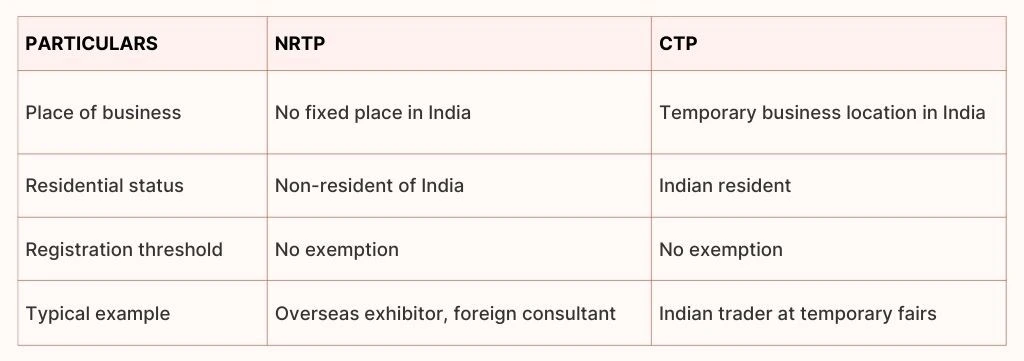Taxability of Non-Resident Taxable Person under GST

The Goods and Services Tax (GST) in India has transformed indirect taxation by merging multiple levies into a unified structure. However, when it comes to foreign businesses or individuals engaging in taxable activities within India, the law provides special rules to ensure proper tax compliance.
One such important classification is the Non-Resident Taxable Person (NRTP). This applies to overseas entities or individuals making taxable supplies in India without maintaining a permanent business location or residence here.
Understanding NRTP provisions is crucial for any foreign participant in Indian trade fairs, exhibitions, short-term projects, or those offering goods and services in the Indian market. This article breaks down the definition, registration process, tax liabilities, compliance rules, and penalties applicable to NRTPs.
Definition of NRTP under GST
Under Section 2(77) of the Central Goods and Services Tax (CGST) Act, 2017, a Non-Resident Taxable Person is defined as:
A person who occasionally carries out transactions involving the supply of goods or services or both, whether as principal, agent, or in any capacity, without having a fixed place of business or residence in India.
In simple terms, this means:
- The person is not an Indian resident.
- They undertake taxable transactions within India.
- Their presence for business purposes in India is temporary and without a permanent establishment.
Example scenarios:
- A US-based manufacturer sells products directly at a trade fair in Mumbai.
- An overseas consulting company sends professionals to India for a month-long training project.
Both examples qualify as NRTP activities under GST.
GST Applicability for NRTPs
GST provisions apply to NRTPs much like they do to domestic taxpayers, with specific rules to safeguard revenue collection.
An NRTP is liable to pay GST on:
- Intra-state supplies (CGST + SGST).
- Inter-state supplies (IGST).
- Import of services.
Common situations triggering GST liability include:
- Selling products at Indian exhibitions or trade shows.
- Offering short-term services such as engineering, training, or consultancy.
- Importing goods into India for temporary sale.
Registration Requirements for NRTP
Mandatory Registration – No Threshold Limit
Unlike regular GST taxpayers who have turnover-based exemptions, NRTPs must register before starting any taxable activity, regardless of turnover.
Registration Process
- Submit an online application on the GST portal (Form GST REG-09).
- Appoint an authorised signatory who is a resident of India.
- Provide documents such as:
- Passport (for individuals) or tax ID proof (for companies).
- Business incorporation certificate.
- Authorisation letter for the Indian representative.
- Address proof for business location in India, if applicable.
- Passport (for individuals) or tax ID proof (for companies).
Registration Validity
- Granted for the period requested in the application or 90 days, whichever is earlier.
- Can be extended once for another 90 days upon request.
Advance Tax Deposit Requirement
A unique feature of NRTP registration is the mandatory advance tax payment at the time of registration.
- The applicant estimates GST liability for the validity period and pays this amount in advance.
- The deposit is credited to the Electronic Cash Ledger and adjusted against actual tax liability.
- If actual liability exceeds the deposit, the balance must be paid before return filing.
- Any unused balance can be refunded after the registration period ends.
Example:
For estimated taxable supplies of ₹20 lakhs at 18% GST, an advance deposit of ₹3.6 lakhs is required before registration approval.
Return Filing & Compliance
NRTPs must adhere to strict compliance timelines.
Return Form: GSTR-5
- Frequency: Monthly or before registration expiry, whichever is earlier.
- Details: Outward supplies, inward supplies, and tax payment.
Due Dates:
- Within 13 days after the month ends or within 7 days after registration expiry.
Invoicing Rules:
- Tax invoices must comply with Rule 46 of the CGST Rules.
- Invoices should clearly show the NRTP GSTIN and applicable tax rate.
Tax Liability & Input Tax Credit (ITC)
Non-Resident Taxable Persons are liable to pay GST on all taxable supplies made in India during their registration period.
However, unlike regular taxpayers, NRTPs face restrictions when it comes to availing Input Tax Credit (ITC).
As per Section 17(5)(f) of the CGST Act, 2017:
- NRTPs cannot claim ITC on inward supplies of goods or services.
- The only exception is ITC on goods imported by the NRTP into India, which is allowed.
- Any GST paid on services or domestic procurements in India cannot be used to offset liability.
This provision ensures that foreign businesses conducting temporary operations in India pay tax on their supplies without fully integrating into the ITC chain.
Difference between NRTP & Casual Taxable Person (CTP)

Penalties & Consequences of Non-Compliance
Non-compliance with NRTP rules can result in:
- Late fee: ₹50 per day (₹20 for NIL returns), capped at prescribed limits.
- Interest: 18% per annum for delayed payment.
- Penalty: 10% of tax due or ₹10,000, whichever is higher.
- Seizure of goods in certain situations.
Foreign businesses risk operational delays, legal complications, and difficulties in obtaining future GST registrations if they fail to comply.
Conclusion
The NRTP framework under GST ensures that overseas suppliers and service providers operating in India meet their tax obligations, even if their business activities are temporary.
Key points to remember:
- GST registration is compulsory before starting operations.
- Advance tax payment is required at registration.
- GSTR-5 filing and proper invoicing are non-negotiable.
Foreign businesses planning to enter the Indian market should familiarise themselves with these provisions to avoid penalties. Partnering with a GST professional can simplify compliance, letting businesses focus on operations while remaining tax-compliant.

.svg)








.svg)
.webp)





